Demonstrators flood Paris Square and much of city center as thousands of others gather at various junctions throughout country, calling on premier to resign
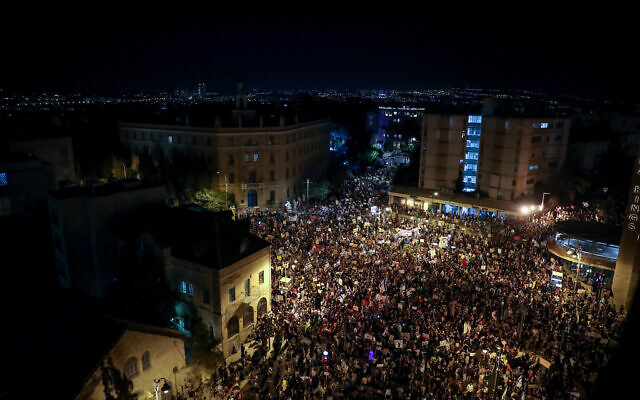
Thousands of Israelis protested against Prime Minister Benjamin Netanyahu outside his official residence in Jerusalem on Saturday evening, in the biggest rally to be held in the capital since the recent start of anti-government protests.
Over 10,000 people attended the anti-corruption demonstration at the Prime Minister’s Residence, according to Hebrew media estimates.
Unlike past protesters there, demonstrators were granted permission to march through the city center along a route that would lead them back to the original protest site.
Besides the rally in Jerusalem, over a thousand people demonstrated outside Netanyahu’s private home in the coastal town of Caesarea, while thousands protested against the premier at bridges and highway overpasses across the country.
Hundreds also gathered at Charles Clore park in Tel Aviv to protest the government’s economic policies during the coronavirus pandemic. After the protest, some of the demonstrators marched toward the city’s Rabin Square, where police have barred the demonstrations from being held.
Also in Tel Aviv, some 100 right-wing activists gathered outside Chief Justice Esther Hayut’s home to protest Supreme Court rulings favoring African migrants. The demonstrators used megaphones and stayed after 11 p.m., in an attempt to draw a parallel with the anti-government protests, which police have stopped dispersing at 11 p.m. despite noise complaints from residents. Two people were arrested at the rally, which was broken up at around 2 a.m.
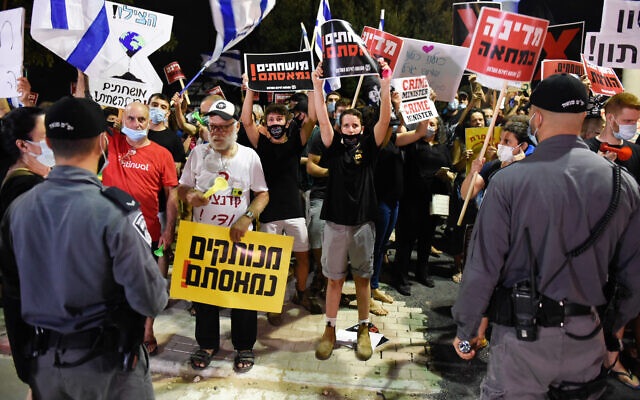
Saturday evening’s protests came amid concerns of growing political violence, after several attacks on anti-Netanyahu protesters by suspected far-right activists. Police arrested four people earlier in the day for accosting demonstrators at a pair of protests in the south and in Haifa arrested a man who threw a rocket at protesters, injuring a woman.
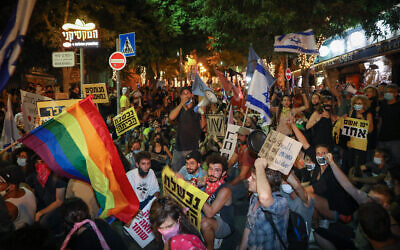
“The Israel Police won’t allow anyone to turn the protest into a display of violence against police officers, citizens or property. Violent riots, violating law and [public] order and vandalism will be dealt with firmly and enforced accordingly,” police said in a statement.
In Jerusalem, acting police commissioner Motti Cohen arrived near the protest outside the Prime Minister’s Residence to follow the force’s preparations.
At previous rallies in Jerusalem, demonstrators have been contained within a small area around Paris Circle next to Netanyahu’s residence, but on Saturday they protested throughout the City Center.
Many of the protesters marched in clusters far past police barricades, waving signs and Israeli flags, while a few police buses and a water cannon were parked at the edge of the demarcated area by Ben Yehuda Street. A large crowd gathered around them, chanting slogans about Netanyahu’s alleged corruption.
Shai Sharfberg, a 31-year-old archaeology student, said he decided to join the protests recently. He said he just wanted Netanyahu to act like other prime ministers under suspicion of corruption.
“Yitzhak Rabin resigned. Bibi called for Olmert to resign. He should do the same,” Sharfberg said, adding he thought Netanyahu seemed too busy dealing with the criminal cases against him to run the country.
Protesters eventually returned to Paris Square where they stayed until after midnight. Police began clearing the area by force at around 1:30 a.m. and opened roads back up soon after.
Authorities did not immediately say how many people were detained or arrested , but several people were seen being carried away by uniformed officers.
— כאן חדשות (@kann_news) August 1, 2020
Earlier, police said they were also preparing for the possibility that far-right protesters might try to again infiltrate the demonstration in order to attack anti-Netanyahu activists, as they are suspected of having done earlier this week.
“In light of the fact that a number of protests in recent days have turned into riots and included violence by demonstrators as well as toward them, police are preparing with forces and means for this as well,” a police statement said.
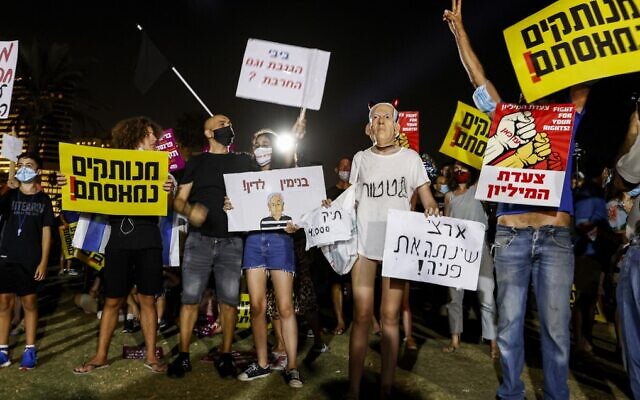
Protester organizers said that had heard from many concerned for their safety at Saturday evening’s protest.
One organizer, Avi Ofer, said some demonstrators were organizing self-defense units formed of graduates of IDF combat units to respond in the event that far-right extremists assaulted anti-Netanyahu protesters.
“There’s a palpable fear that’s spreading among us about what could happen. Especially on side streets when we leave the protest where there’s no police presence,” said Mor Elyakim, another protest organizer, referring to demonstrators reportedly attacked by far-right extremists in Jerusalem after leaving the Balfour demonstrations.
In the wake of the recent violence toward anti-Netanyahu protesters, the premier himself has increasingly complained about alleged threats and “incitement” against him by demonstrators. He and some of his supporters has also spoken out against the anti-government protesters as “anarchists.”
Transportation Minister Miri Regev, a Likud party ally of Netanyahu’s said Saturday evening the protests were “a campaign of incitement against the prime minister and the right.”
“It is a campaign of incitement by the left, funded by the New Israel Fund,” she told Channel 12 news.
Another vocal critic of the protests has been Public Security Minister Amir Ohana, like Regev a vocal Likud supporter of Netanyahu. In a recent recording, Ohana was heard pressing the Jerusalem police chief to quash the protests outside the Prime Minister’s Residence and a Channel 12 report on Friday said he implied to a top candidate for police commissioner he could get the appointment if he adopted the minister’s desire for a strong-handed approach to the ongoing demonstrations.
On Saturday, Ohana denied he was trying to politicize the police or that he had asked them to use water canons, clubs or stun grenades against protesters.
“I don’t deal with the ‘how,’” he wrote on Facebook. “That is an operational consideration. Only equal police treatment for all population groups will guarantee a police that isn’t political.”
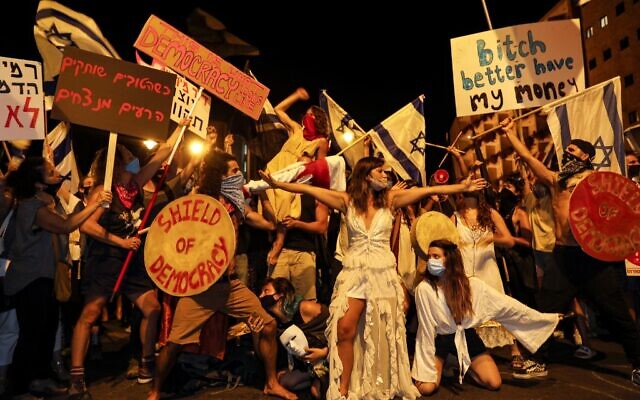
Protesters have for weeks been holding regular rallies outside the Prime Minister’s Residence on Balfour Street in Jerusalem, as well as in Tel Aviv and other areas, calling on the premier to resign due to his indictment on corruption charges. They have been joined in recent weeks by people protesting the government’s economic policies during the coronavirus pandemic, with crowds in the thousands and rising.
Netanyahu is on trial for a series of cases in which he allegedly received lavish gifts from billionaire friends and traded regulatory favors with media moguls for more favorable coverage of himself and his family. The prime minister has denied any wrongdoing, accusing the media and law enforcement of a witch hunt to oust him from office.
As reported by The Times of Israel
